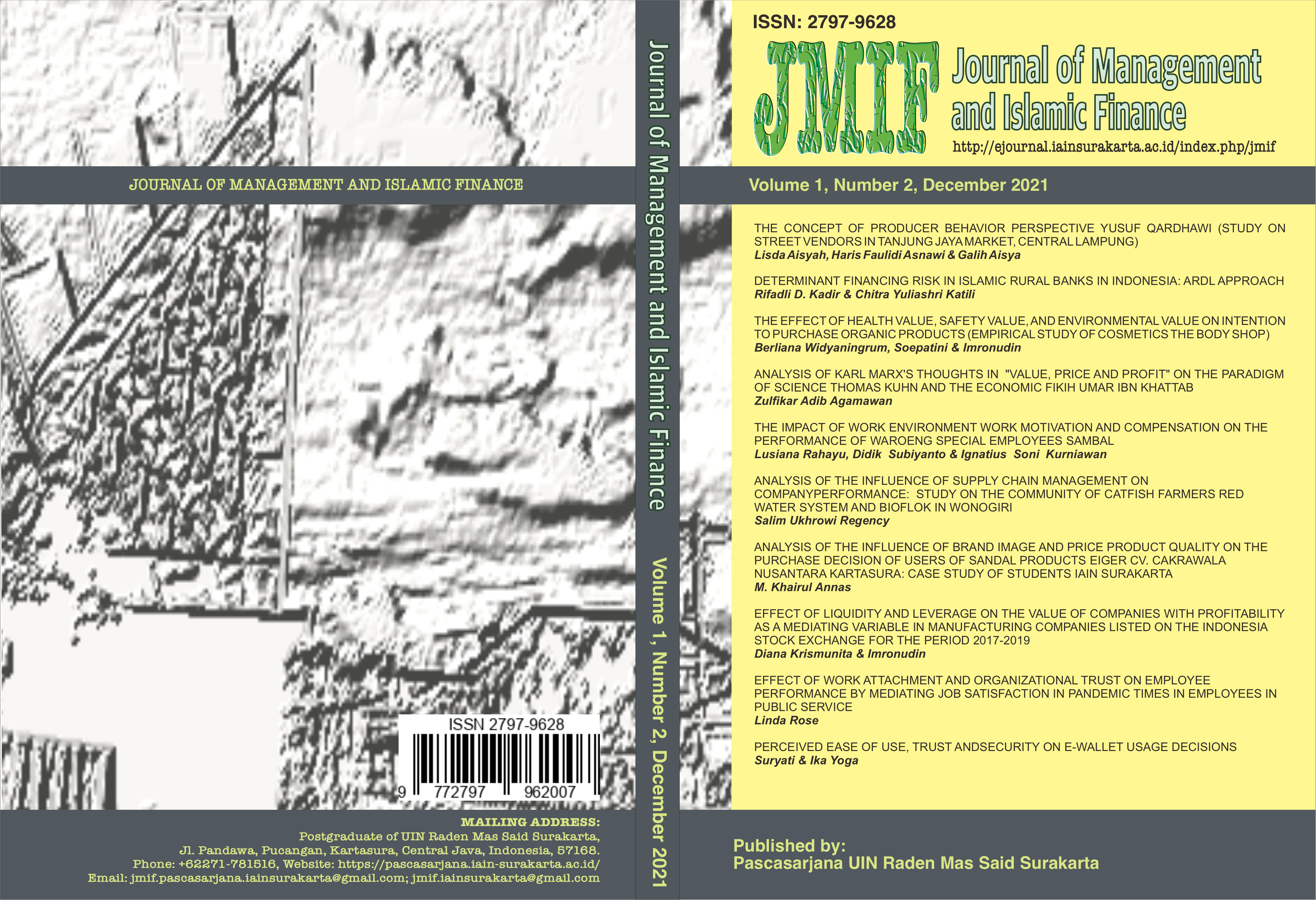THE CONCEPT OF BEHAVIOR OF PRODUCERS PERSPECTIVE YUSUF QARDHAWI: STUDY ON THE FIVE FEET VENDORS AT TANJUNG JAYA MARKET, CENTRAL LAMPUNG
DOI:
https://doi.org/10.22515/jmif.v1i2.4140Keywords:
Producer Behavior, Robbaniyyah, Akhlaqiyyah, Insaniyyah, WashatyAbstract
The efforts of producers to obtain maximum benefits can be realized if producers apply Islamic values. The benefits and blessings obtained by the producers are one thing that will contribute to the achievement of falah. Yusuf Qhardhawi has stated that there are 4 pillars that must be carried out by a Muslim producer. In this way, the producer will obtain essential happiness, namely glory not only in the world but also in the end. The purpose of this study is to analyze how the behavior of Muslim producers among street vendors in Yusuf Qhardhawi's perspective (Study on street vendors in Tanjung Jaya Market, Lampung Tengah. The research method used is qualitative descriptive method. From the results of this study, it can be seen that the four main pillars for behaving according to the behavior of Muslim producers are stated by Yusuf Qardhawi, namely: Godhead (Robbaniyyah), Ethics (Akhlaqiyyah), Human resources (Insaniyyah) and balance (Washaty), only 2 pillars practiced namely the pillar of human resources and balance, while the pillars of divinity and ethics are not all street vendors apply these pillars in practice. This is the proof that street vendors in the Tanjung Jaya market, Lampung Tengah, have not been in accordance with the behavior of Muslim producers according to Yusuf Qardhawi.Â
Downloads
References
Abdul Aziz. (2008). Ekonomi Islam Analalisis Mikro dan Makro (Cetakan Pe). Graha Ilmu.
Abdul Aziz Dahlan. (2001). Ensiklopedi Hukum Islam. PT. Ikhtiar Baru van Hoeve.
Departemen Agama RI. (2003). Petunjuk Tekni Pedoman Sistem Produksi Halal. Jenderal Bimbingan Masyarakat Islam dan Penyelenggaraan Haji Departemen Agama RI.
Etika Produksi Perspektif Ekonomi Islam. (2010). Jurnal Ekonomi Islam Al-Infaq, Vol. 1, No(Bogor: Fakultas Ilmu Agama Islam, Universitas Ibnu Khaldun).
Heri Sudarsono. (2004). Konsep Ekonomi Islam Suatu Pengantar. Ekonisia.
Lukman Hakim. (2012). Prinsip-Prinsip Ekonomi Islam. Erlangga.
Misbahul Ali. (2013). Prinsip Dasar Produksi dalam Ekonomi Islam. Jurnal Lisan Al-Hal, Vol. 5(No. 1).
Muhammad. (2004). Ekonomi Mikro dalam Perspektif Islam. BPFE-Yogyakarta.
Nashruddin Baidan dan Erwati Aziz. (2014). Etika Islam dalam Berbisnis. Pustaka Pelajar.
Pusat Pengkajian dan Pengembangan Ekonomi Islam (P3EI) Universitas Islam Indonesia Yogyakarta atas Kerja sama dengan Bank Indonesia. (2009). Ekonomi Islam (1st ed.). Rajawali Press.
Sri Laksmi Perdanawati. (2015). Perilaku Produsen Islam. Jurnal Ilmiah Ekonomi Islam, Vol. 01(No.01).
Supardi. (2005). Metodologi Penelitian Ekonomi Bisnis. UII Press.
Ulul Azmi Mustofa. (2014). Penerapan Corporate Social Responcibility pada BCA dan BMI Perspektif Ekonomi Islam. Jurnal Akuntansi Dan Pajak, Vol. 15, N(Juli 2014, STIE AAS Surakarta).
Yusuf Qardawi. (1997). Norma dan Etika Ekonomi Islam. Jakarta.
Downloads
Published
Issue
Section
Citation Check
License
Authors who publish with this journal agree to the following terms:
- Authors retain copyright and grant the journal right of first publication with the work simultaneously licensed under a Creative Commons Attribution License that allows others to share the work with an acknowledgement of the work's authorship and initial publication in this journal.
- Authors are able to enter into separate, additional contractual arrangements for the non-exclusive distribution of the journal's published version of the work (e.g., post it to an institutional repository or publish it in a book), with an acknowledgement of its initial publication in this journal.
- Authors are permitted and encouraged to post their work online (e.g., in institutional repositories or on their website) prior to and during the submission process, as it can lead to productive exchanges, as well as earlier and greater citation of published work.






